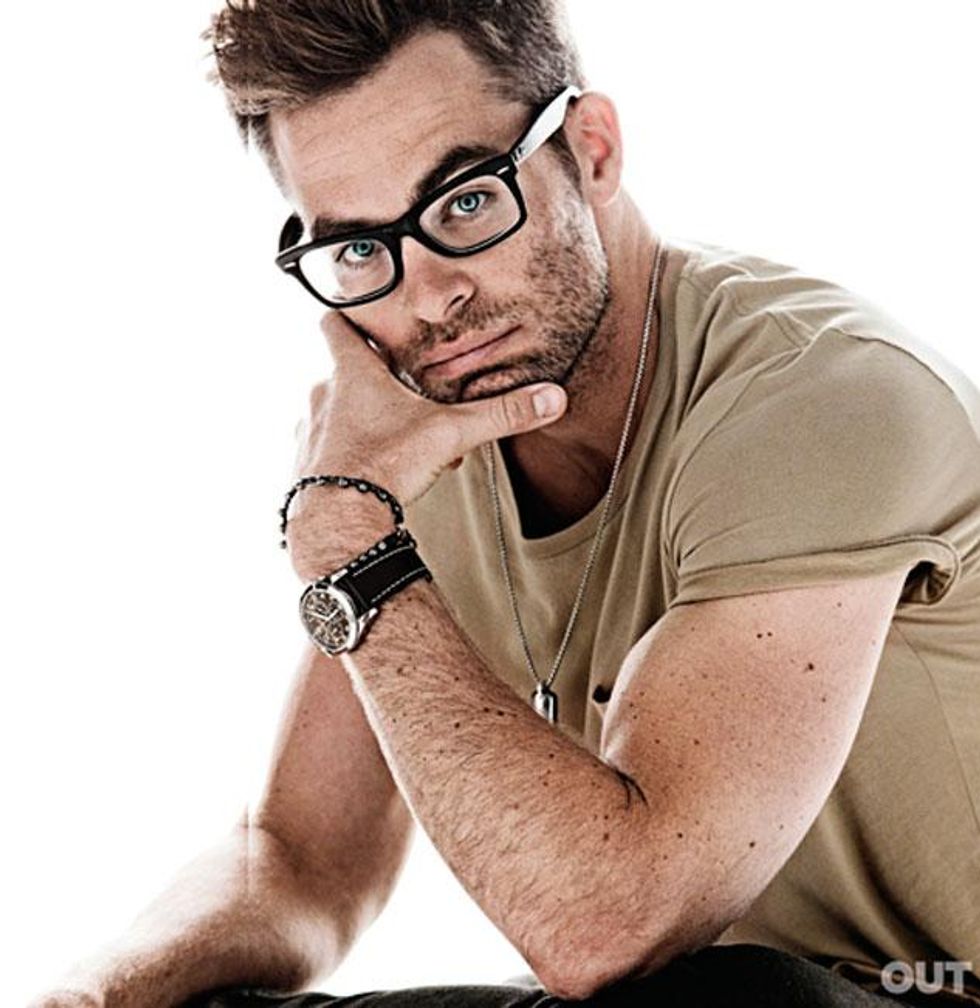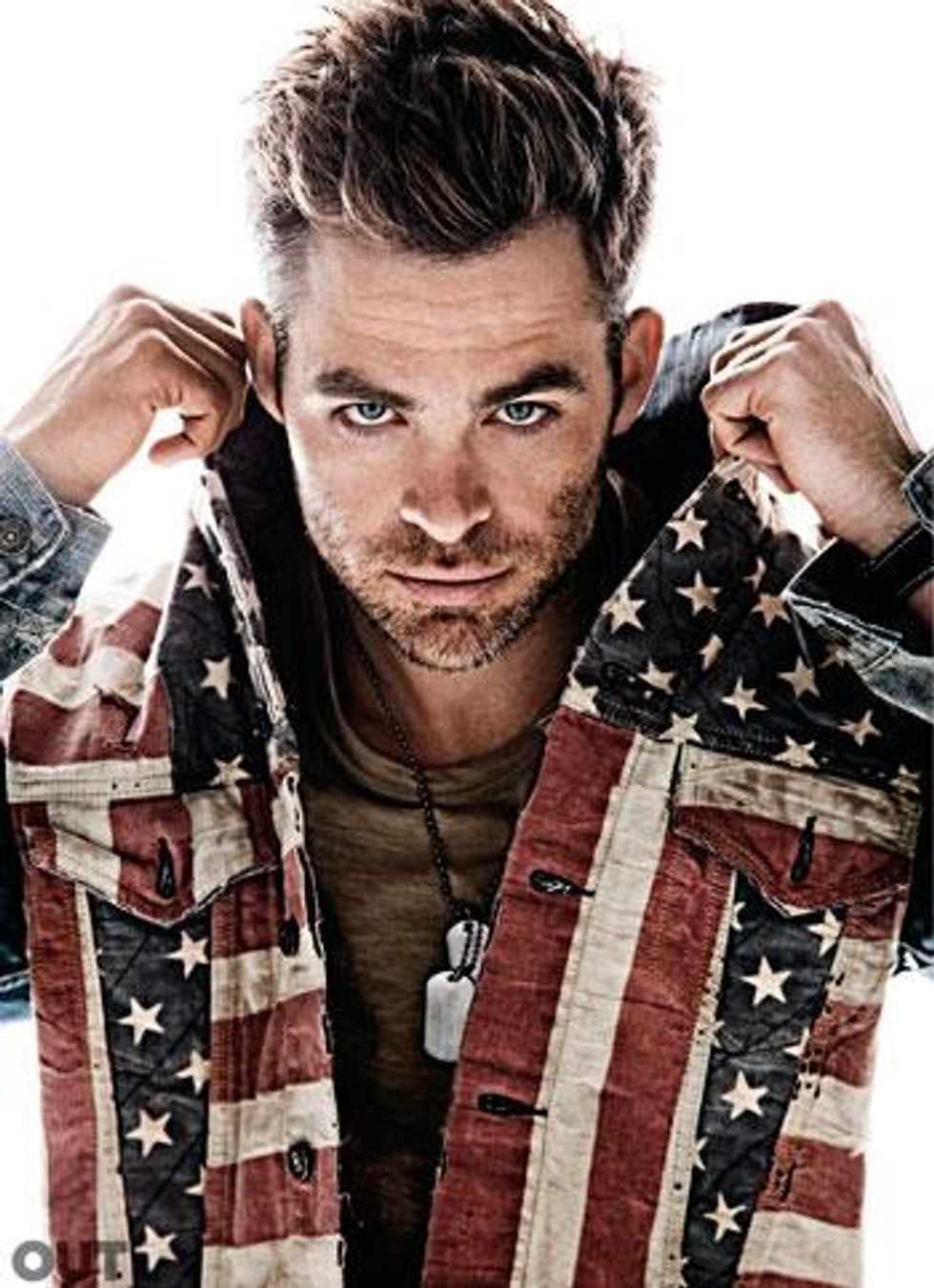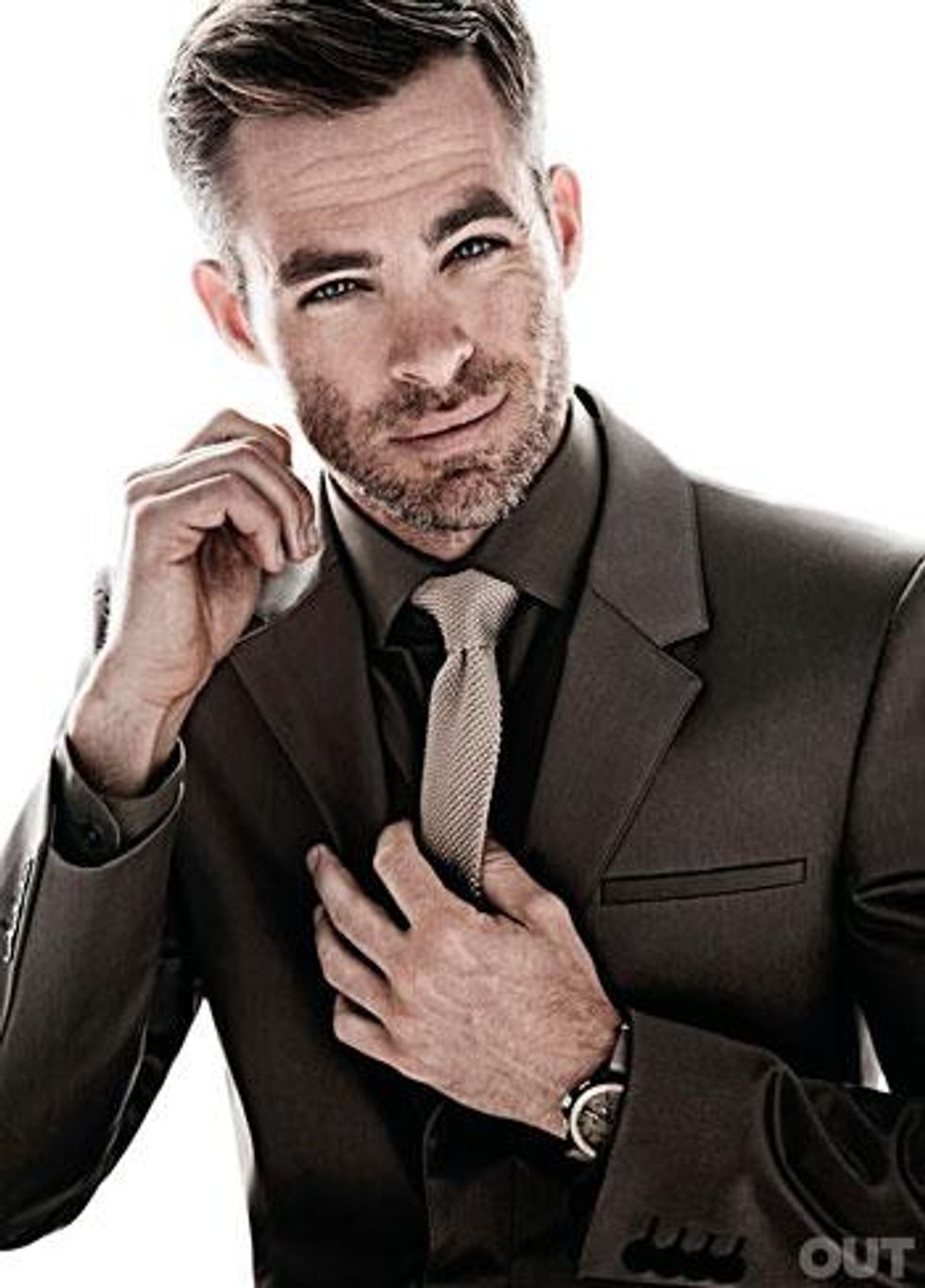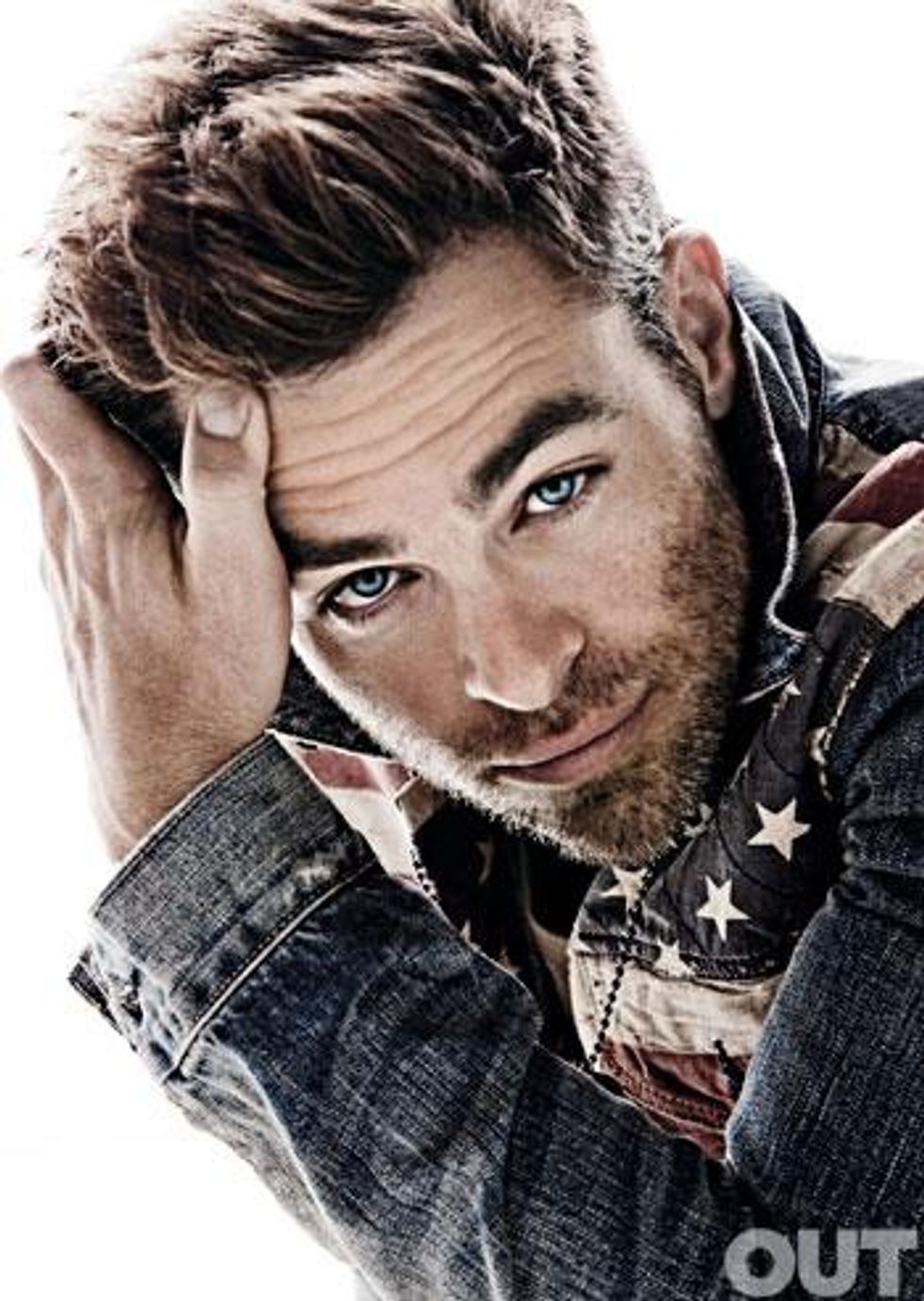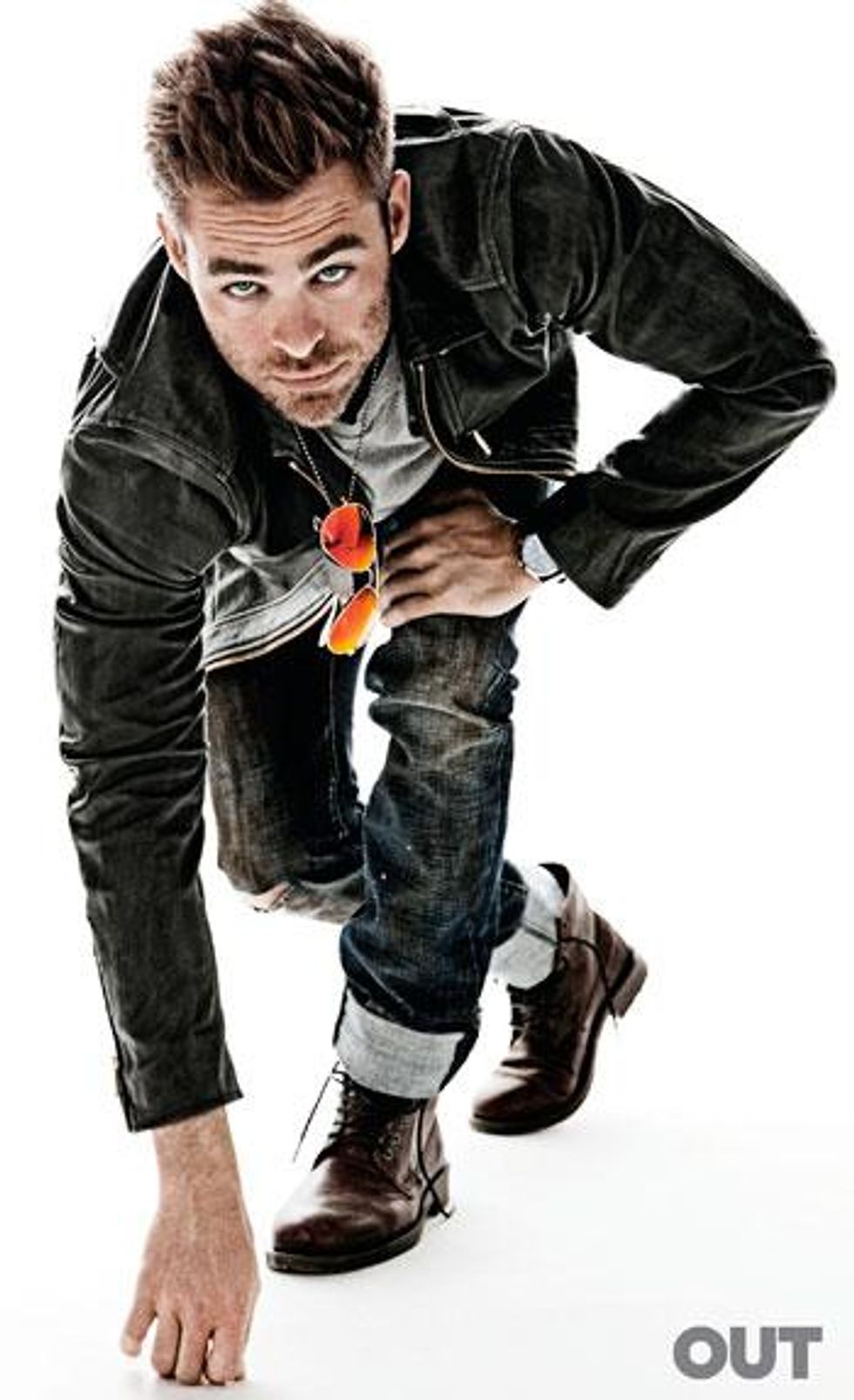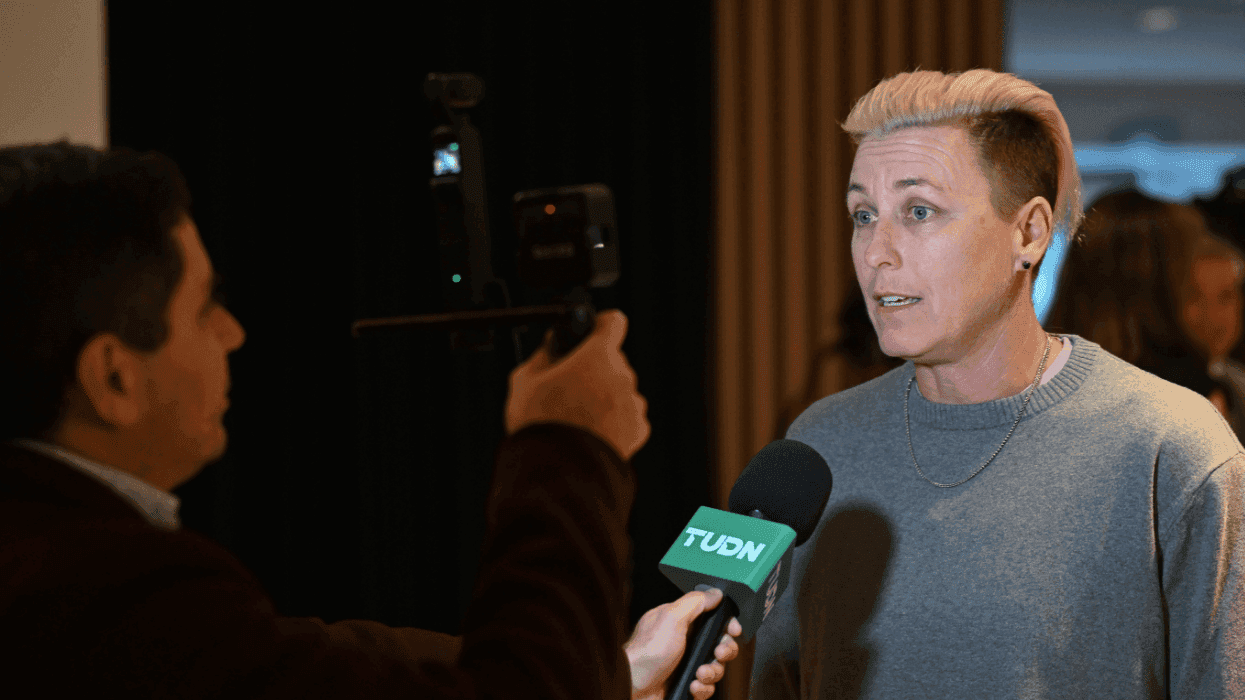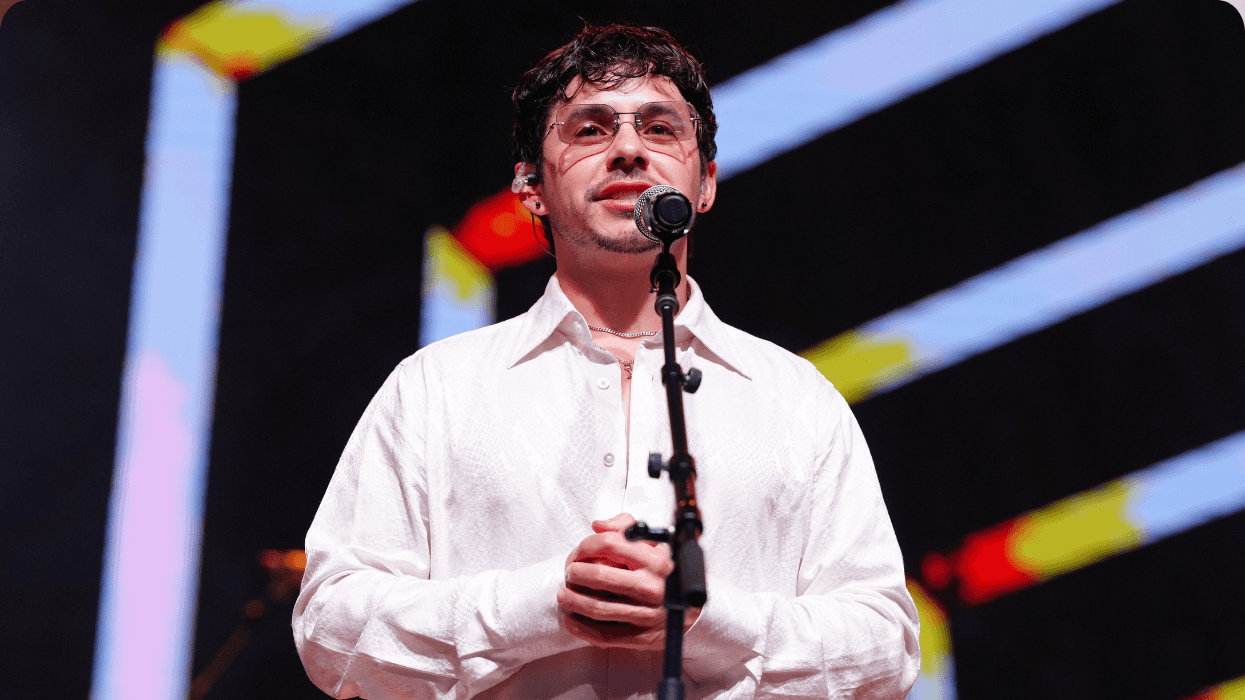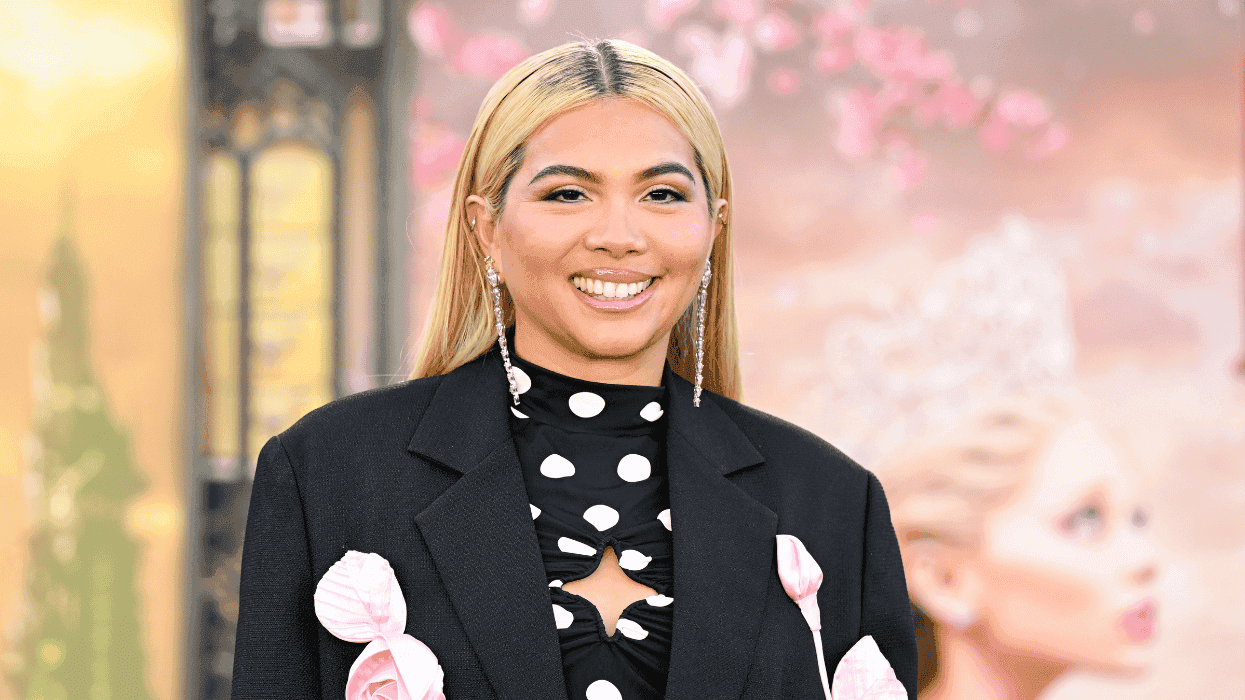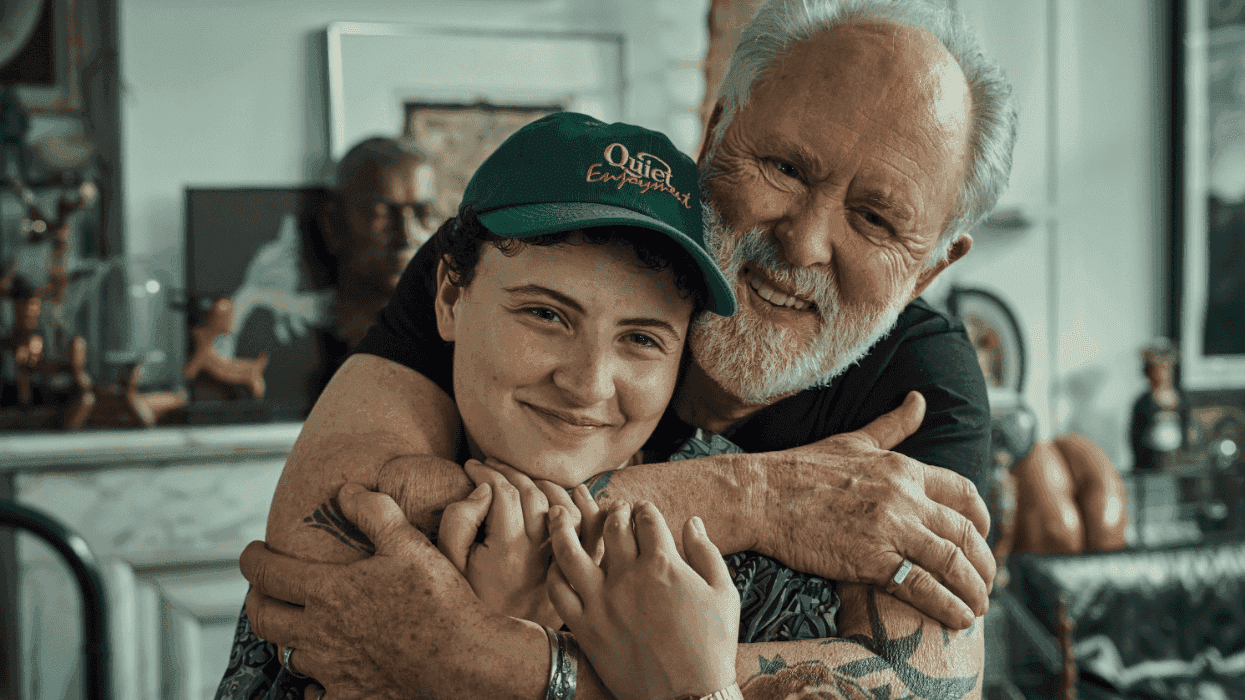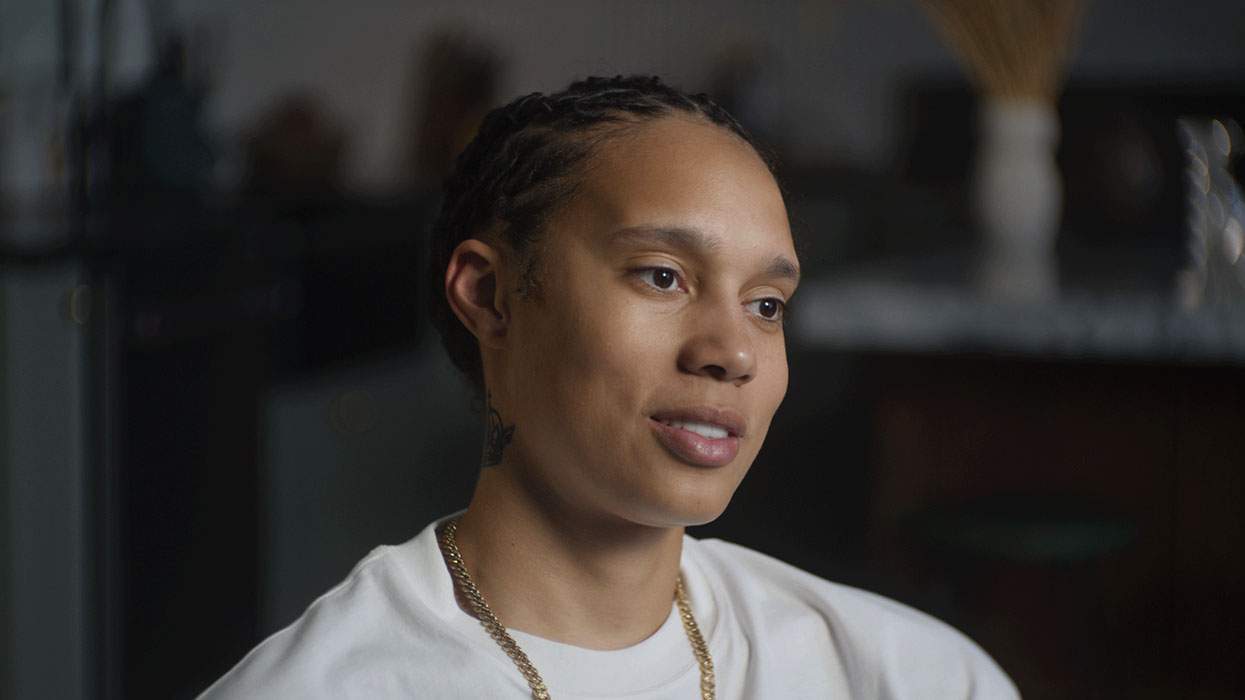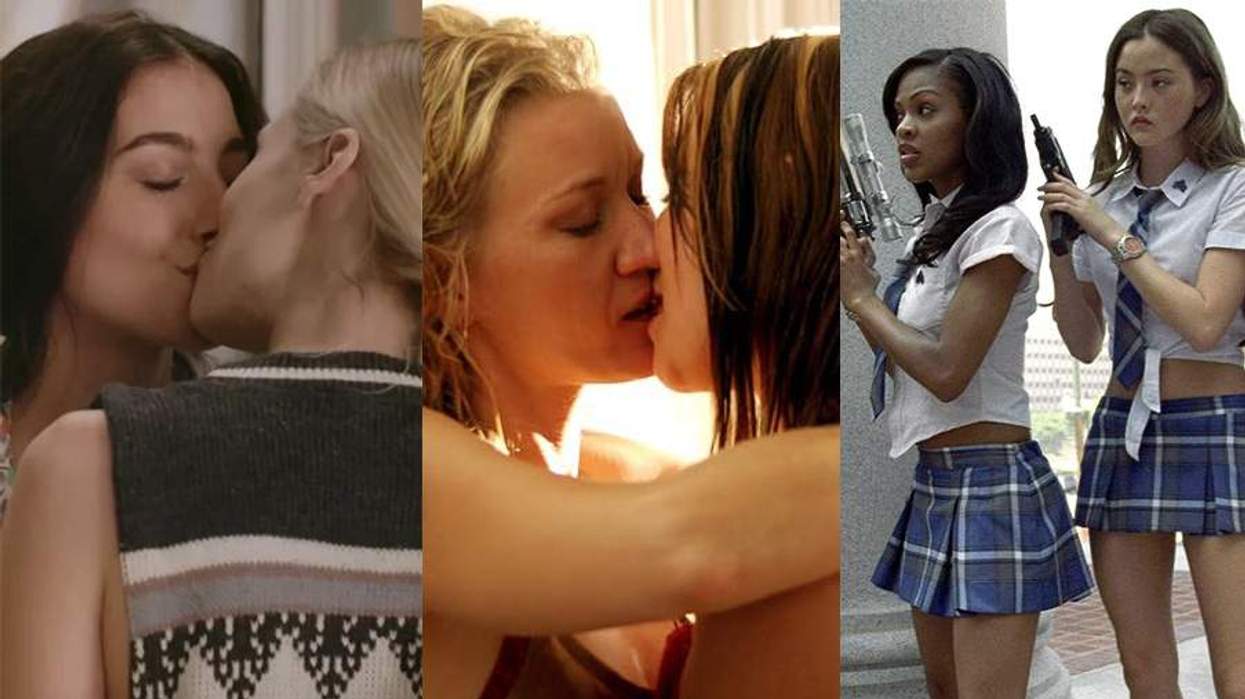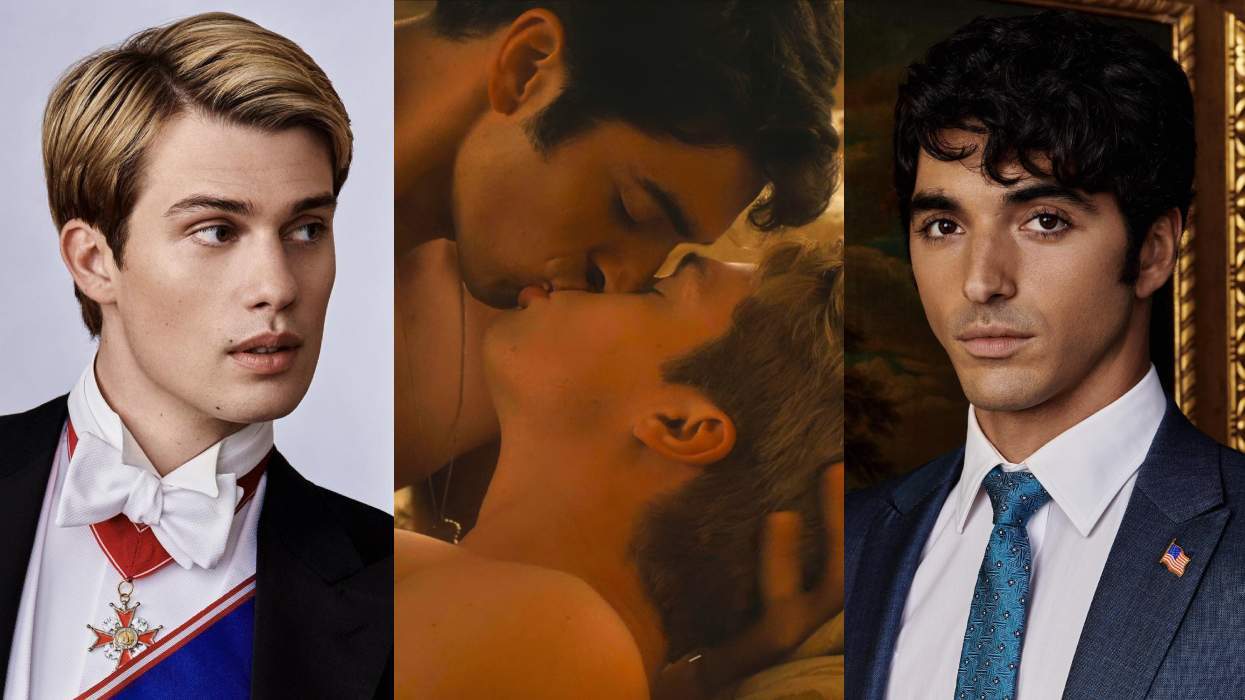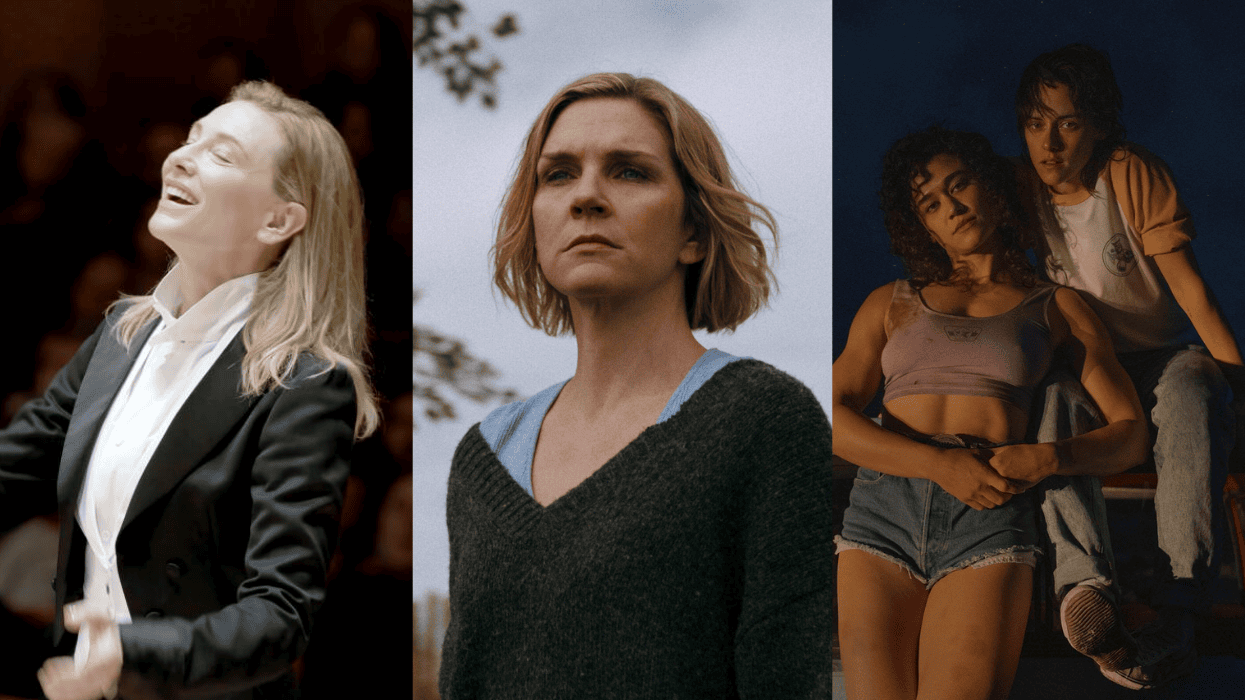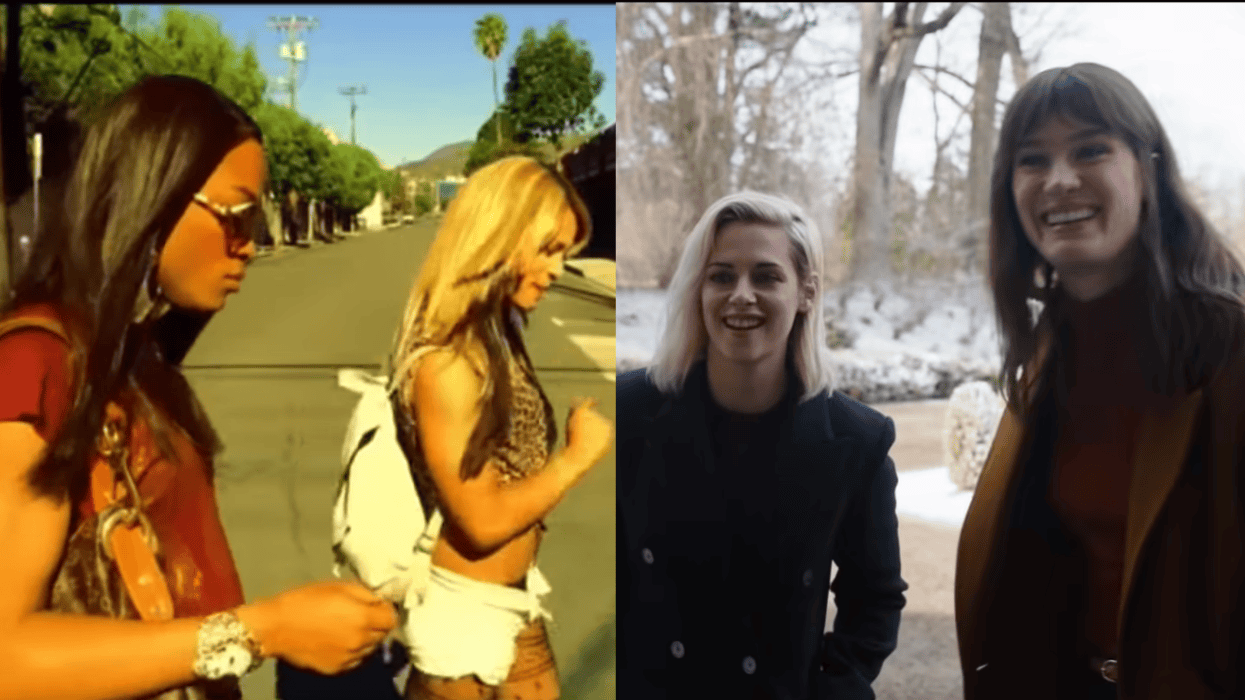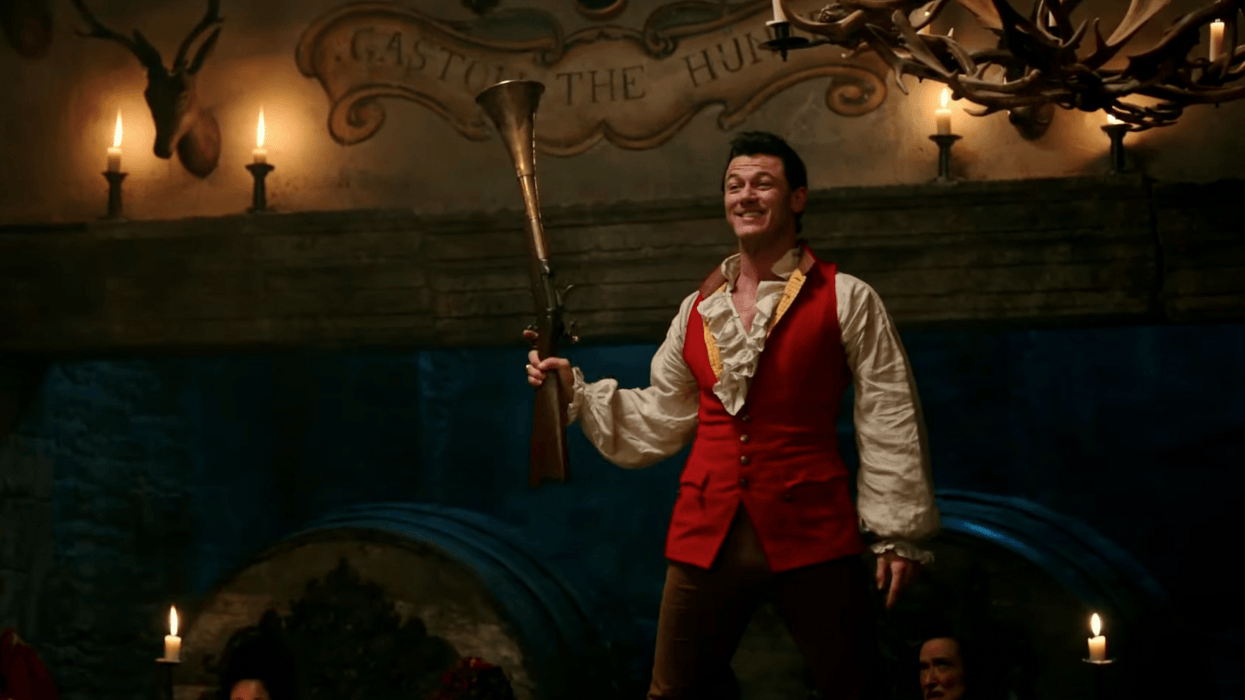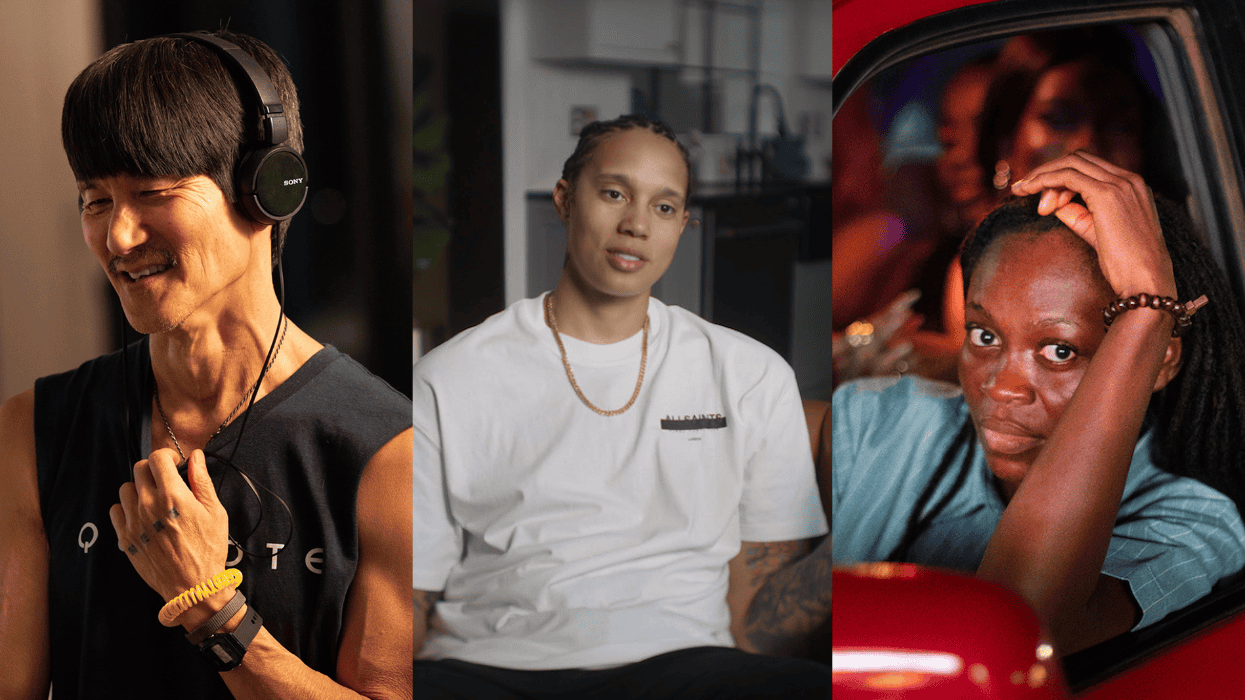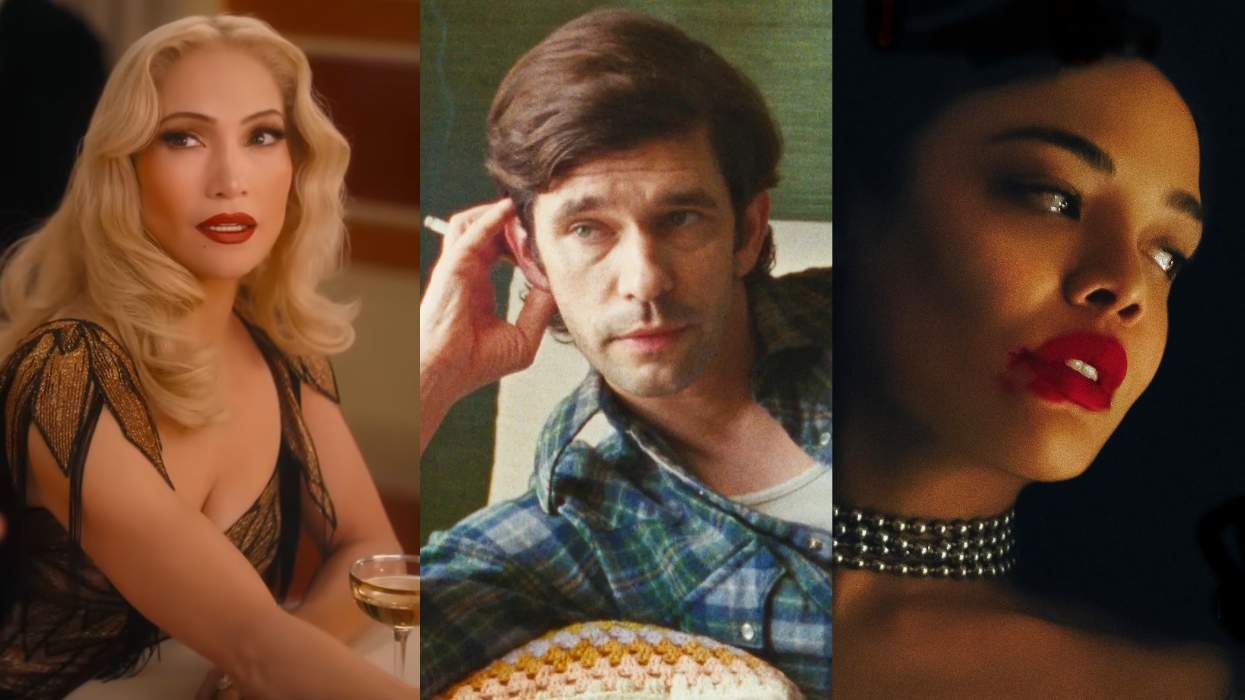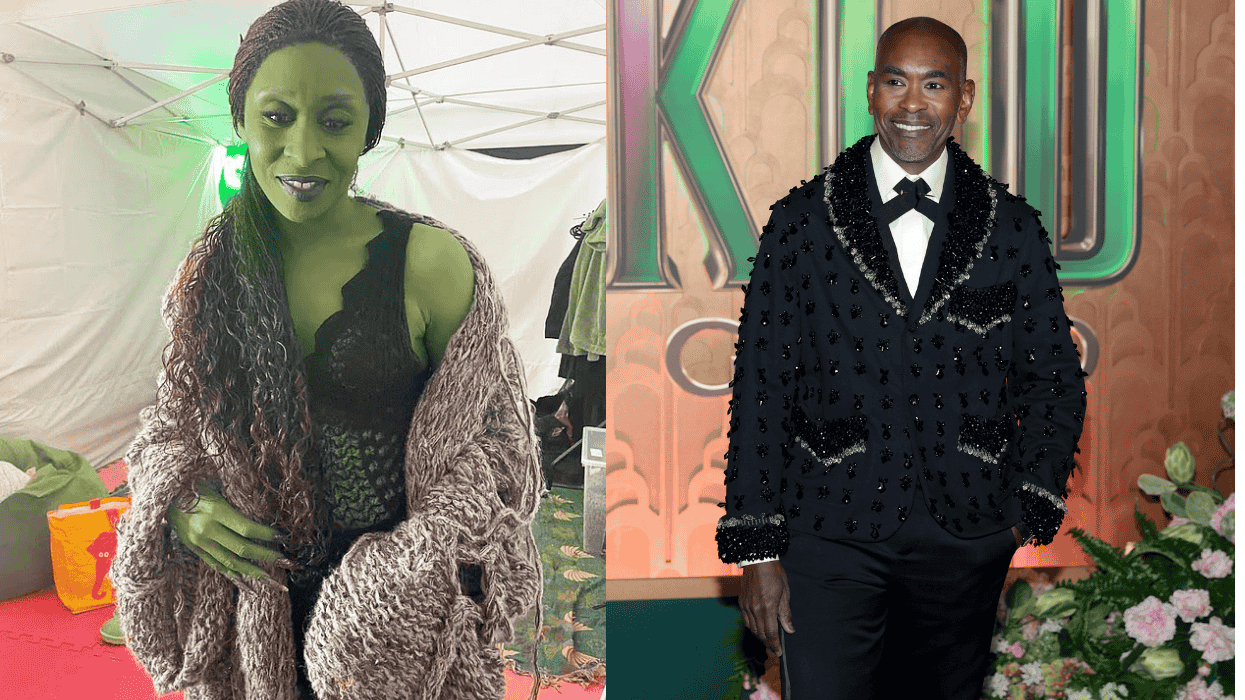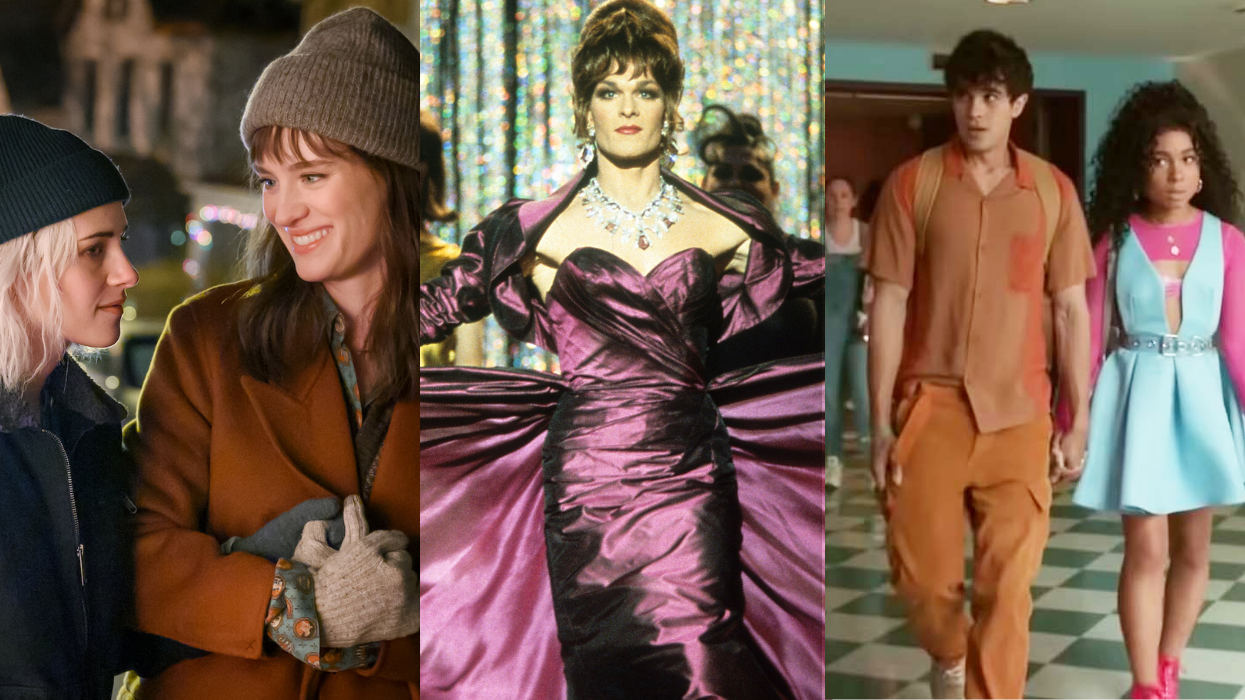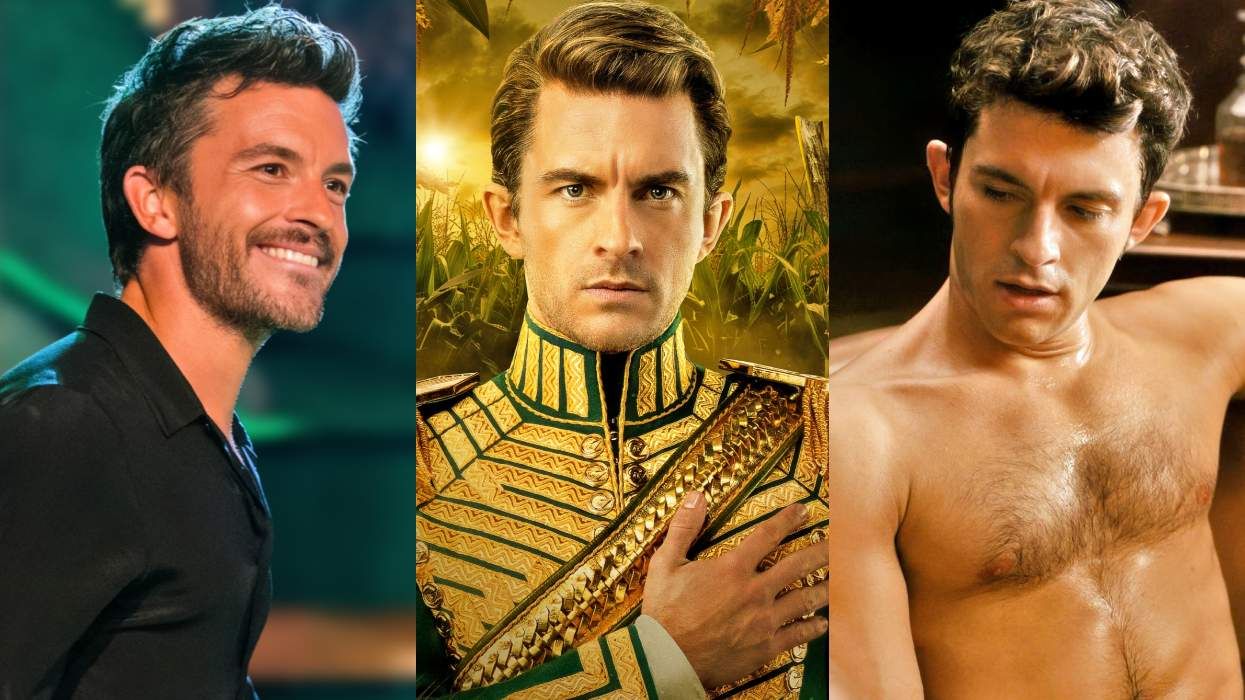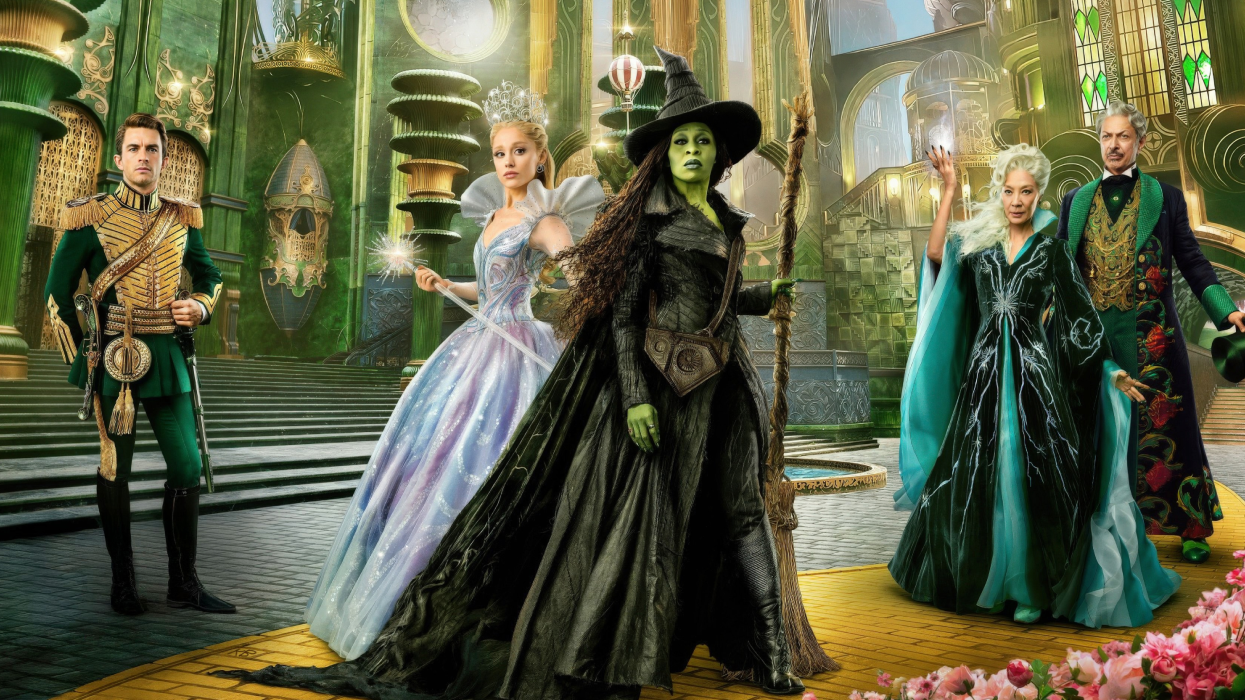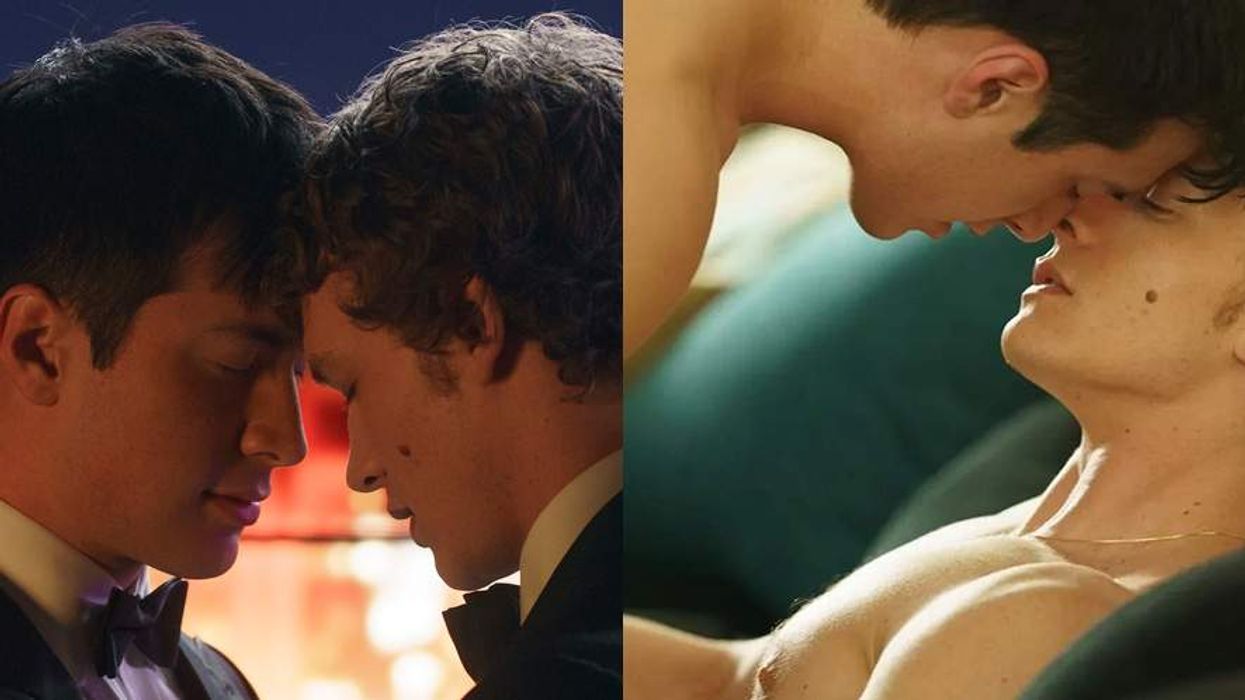Photography by Nino Munoz
Chris Pine shows up with a thesis statement. "I think there is a growing homogenization of what masculinity means," he says.
Asked by Pine's reps a week earlier for a brief outline of the focus for this piece, I'd fired off a vague, pretentious email about how leading men in movies seem ripe for reinterpretation -- especially, say, the kind of characters Pine plays, like Star Trek Into Darkness's Captain Kirk or, coming later this year, Tom Clancy's CIA hero Jack Ryan. Maybe he would want to talk about that.
He's read my email. He's come prepared.
Heroes in today's films all look the same, Pine argues, ticking off a list: "Bare chested. Very tan. White. Brown hair, blue eyes, perfect skin." He grimaces. "That is so -- not real."
But Pine seems very real, in a very perfect, unreal way. Today, sitting outside a small coffee shop in Los Angeles, he's wearing a baseball hat, sneakers, slim-fit cargo pants, and a tight white tank top. The California sun glints off his golden-brown shoulders, and, when he lifts his sunglasses, his eyes are most definitely blue. (Indoors, they are a speech-stoppingly bright blue, a shade so intense I'd assumed they only looked that way onscreen because of some post-production magic.)
Somehow he doesn't draw any undue attention sitting smack in the middle of a Sunset Boulevard sidewalk with his iced coffee and chicken sandwich. Maybe it's because we're slightly off the city's center aisle at Intelligentsia, a low-key neighborhood staple in Silver Lake, and he's dressed more like the well-maintained bro next door than a guy who will star in not one but two massive franchise films in 2013.
Or maybe it's because he doesn't want to preen for a celebrity puff piece. "Trying to think of new ways to talk about myself is always... odd," he says. He'd rather wax poetic about masculinity -- and he will, at length. "It really got me thinking," he says. "I don't even know where to begin."
***
Pine reminds me that there's something people always say about a guy like him: "The big joke is, what are you going to do with an English major?"
He's not kidding -- he earned his bachelor's degree from the University of California, Berkeley's top-notch English department in 2002 -- but even without the pedigree, it's obvious this guy is smart. Not just actor smart. Not just wisecracking late-night talk-show smart or charming, control-the-narrative-of-your-own-cover-story smart. He's the kind of smart you have to hustle to keep up with. The kind of smart that seems unfair, given the fact that he's also a keenly talented actor who stares at you so sincerely with those blue eyes while spitting out 50-point Scrabble words.
It's possible that Pine's success is in part a fluke of timing. He's come into the prime of his leading man potential just as action movies--still the gold standard for a box office-driven industry obsessed with drawing young men into its clutches--seem to be getting more intelligent, even if they cycle through the same archetypal territories of daddy issues, best-buddy bromances, and reluctant heroism.
Nerd king Joss Whedon (a feminist film studies major once best known for creating Buffy: The Vampire Slayer) helmed the biggest opening-weekend box-office success of all time with last year's complex comic supergroup, The Avengers. Sam Mendes (American Beauty) made a new man out of James Bond in the artsy, slick Skyfall. And Pine's two big tentpole movie directors -- Star Trek's J.J. Abrams and Jack Ryan's Kenneth Branagh -- used to be synonymous with critically acclaimed TV (Lost) and William Shakespeare, respectively.
Branagh, who also gave us Chris Hemsworth as Thor, has a simple formula for upping the ante: "You just assume at all times that the audience is as smart -- and probably much smarter -- than you are," he says. "The best action movies are when you feel that there's a credible motivation behind what's going on. People like Chris Pine, they go hunting for that. They've got this radar for the truth, and they try to apply that--however fantastical the situations may be."
Like those grown-up geeks now let loose in the studios' big sandbox, Pine is a serious student of the silver screen -- especially its leading men.
"You take someone like a Bruce Willis or a Charles Bronson -- the definition of masculinity there becomes about the ability to inflict violence, take revenge, take what's yours," he says. "I'm thinking in my mind about Clint Eastwood squinting with the gun in Dirty Harry. Not smiling, squinting -- very cold and cut off."
"But then you have Marlon Brando in The Wild Bunch. In Streetcar Named Desire or Last Tango [in Paris]. Or Tom Hardy, I think, has it -- this ability to inflict incredible violence in the blink of an eye, but then also to cry and to show great vulnerability. Those two polarities are in many ways indicative of the human experience in its most extreme."
None of those are quite the kind of male movie star Pine has become. He carries too much mirth to be stone-cold cruel, too much charisma for the brute force Hardy displays, for example, in Warrior. Branagh cites another blue-eyed antecedent: "It goes back to someone like Paul Newman," he says. "The character actor in the leading man's body -- Chris has that."
SLIDESHOW: EXCLUSIVE SHOTS Of CHRIS PINE for OUT
There's also a certain softness, sometimes, around Pine's edges. He has one specific boyhood movie hero memory he can't quite pin down -- a British romance, maybe something by one of the Bronte sisters. "I just remember this shot of him walking through grass," Pine says, "with the coattails and the white pants and the riding boots, walking through some English countryside. And I was like -- goddamn. He is such a man! Strong and purposeful and going toward his beloved. I wanted to walk like that."
He throws up his hands, defeated, surrendering in awe. "So what is masculinity?" he asks. "I don't know. I feel like I haven't answered anything about it."
***
Pine skated dangerously close to getting typecast -- not as a brooding, rebellious, motorcycle-riding man of action, but a watered-down rom-com prince.
Growing up a third-generation actor in Los Angeles, he developed an unusual mix of practical yet aspirational self-awareness about what it means to choose this career. It's not as if he were to the Barrymore manor born; his grandmother, Anne Gwynne, was a horror-movie scream queen, and his dad, Robert, is best known for CHiPS and still works as a journeyman TV player. His mom acted, too, before becoming a therapist. It's a company town, and they made a living.
Pine followed the expected college-prep track in high school, which landed him at Berkeley, a great school he wasn't quite ready for. "You're taught to get good grades, but you're not really taught to find your own passion," he says. "I found it really confining." He spent a year at the University of Leeds in England, started cheating on books with plays, hanging out with theater kids, and then hitting the stage himself.
After graduation, he was back in Los Angeles, netting a handful of TV guest star roles before his first big break: 2004's The Princess Diaries 2, opposite Anne Hathaway.
The reaction was a wake-up call. "One reviewer said, 'He's a Rob Lowe lookalike with the charisma of a David Hasselhoff.' I'll take the Rob Lowe lookalike, that's fine. But I remember the charisma part really fucking well. It might have said 'not even half the charisma of a David Hasselhoff.' I don't know why we're programmed this way, but all I remember is the nasty shit. And, I swear to God, if people think it's going to tear me down, it's like kindling in my fucking steam engine."
SLIDESHOW: EXCLUSIVE SHOTS Of CHRIS PINE for OUT
There was plenty of feedback to keep the fire stoked through the run of shallow films that followed. The best was a TV movie-of-the-week with Diane Keaton, Surrender, Dorothy, in which he plays gay with a casual, sweet sincerity. "My first intimate scene [onscreen] was with Tom Everett Scott," Pine says. "He's an incredible spooner -- very warm, very sensitive."
In 2006, it was almost impossible to imagine that Abrams would make Star Trek into a mega-movie that appealed to die-hards and newbies alike. Zachary Quinto, cast as the young Spock, bore an uncanny resemblance to Leonard Nimoy, but Pine wasn't the obvious choice. "I wouldn't follow me into battle," Pine told Entertainment Weekly then. But the two had crazy chemistry, and Abrams was sold. The new film blasted Trek records, grossing almost $400 million worldwide.
Welcome to life on the A-list, Mr. Pine.
He clung to his normal-guy shtick in the midst of his sudden exponential exposure. For way longer than made sense he lived in the same modest apartment and followed the same daily routine: pick up The New York Times at 7-11, dash across the street for a fancy coffee, dodge traffic, and -- this part was new -- duck the paparazzi.
And then there were the fans.
One undeniable upside: being courted by top directors. Tony Scott (Top Gun) put him up against Denzel Washington in Unstoppable. McG, the king of unnecessary, enormous video game-style explosions, cast him as Tom Hardy's BFF in the Bond-lite This Means War, an actiony rom-com with Reese Witherspoon that is far more entertaining if you view it as a homoerotic Mr. & Mrs. Smith. (McG even shot an alternate ending where Pine and Hardy's characters literally end up in each other's arms.) In between, Pine did two critically acclaimed plays that won good reviews and a Los Angeles Drama Critics Circle Award.
Pine doesn't flinch away from talking about himself as a movie star, even if it's with the same serious, analytical tone. ("I liked the Avedonian vibe," he says of Out's cover shoot, "how it becomes purely about the architecture of the shot.")
And a modern male movie star has to take care of his body, or at least pay someone to badger him into yoga or boxing or basically anything that doesn't require being stuck in a gym. Tennis -- especially outside -- where he can work up a good sweat while catching up with old friends, is acceptable. "It's strictly for vanity," he admits, laughing. "I need accountability. I need to know that I will lose out on money if I don't show up. Otherwise, I'll be chain smoking and drinking copious amounts of coffee. I wish I had the fucking willpower."
He's just off a three-week green juice regimen, his first-ever cleanse, and though he liked how good it made him feel, he is chagrined at one lingering effect: "I can't eat pasta like I used to, even, like, a month ago. It's too much. And nothing beats a good bottle of red wine and some Italian food."
He confirms, despite a long list of actresses and models and reality stars he's been linked to in the past, that he's currently a bachelor. "It's really hard in our business to maintain something," he says. "For me, right now, it'd be really hard." But it's a sunny day, and he's a movie star. It can't be that hard. "Well, I'm a 32-year-old man," he says, and half-covers a not-so-bashful grin with his hand. "I feel like it's always springtime."
For a guy who studied English mostly because he liked reading -- "I tried philosophy, but it was too restrictive" -- these days he doesn't get to dig into a book all that often. He's hesitant to admit the last novel he remembers finishing is Jennifer Egan's Pulitzer Prize-winning A Visit From the Goon Squad -- his back-cover blurb: "Blew my mind -- the melancholy of time passing, of regret, of moments lost" -- and has been trying to find time to concentrate on Water Music by T.C. Boyle. ("His imagination is stunning, and his command of language is -- I'm just circling words.")
Mostly, that four-year degree contributed to a kind of critical speed-read technique. "I think I've read 20 scripts in the last two and a half weeks," he says. "Those tools are indispensable, all those little micro-muscles in your brain that are just trained to see certain things. All you do all day is read, break down story, structure, character, and technique."
***
Pine has found a formidable foil and word-sparring partner in crime in Trek costar (and fellow Out cover boy) Zachary Quinto. In modern movie tradition, the two spend arguably as much time sitting side by side at press junkets as they do on set. There is even one YouTube clip cut together to highlight a lengthy war of vocabulary one-upsmanship between them. ("The rivalry that we have in life is really rooted to the mastery of the English language," Quinto jokes in the video.)
Kirk and Spock occupy a high throne in postmodern media studies, the academic form of super-meta criticism that came into fashion just after Pine's college days. Their epic, devoted relationship inspired the earliest examples of fan fiction, collected in Xeroxed zines and distributed at sci-fi conventions. This pre-dated the Internet, decades before homoeroticism became a part of queer film theory. Eventually bromance entered the mainstream lexicon as a way to describe the intense connection between two male characters.
SLIDESHOW: EXCLUSIVE SHOTS Of CHRIS PINE for OUT
Or you could just call it a love story. "In the tradition of many great romances," Manohla Dargis wrote in The New York Times review of the 2009 film, "the two men take almost an instant dislike to each other."
"I always thought about it more like it was the dialectic of a human being," Pine says. "One couldn't be more logic and reason -- that's his genetic coding. And the other is more impulsive, following his passion, his fists. That was how it was a functional relationship. You have Spock as the cold reason, you had the passion of Jim Kirk, and then you had the ironic sarcasm of McCoy, which gave the whole thing levity. That dynamic was beautiful."
Quinto concurs. "I love that he and I got to inherit that dynamic, which obviously pre-exists us thanks to Leonard [Nimoy] and Bill Shatner," Quinto says. "It's endlessly fascinating to me, and that's why I think the characters and the story and the franchise are so enduring."
"That relationship is the core of what Kirk goes through," Pine says. "The arc and the trajectory of his journey is huge, almost Greek. But it's through his relationship with Spock that he learns the greatest lessons, about loving someone to the point of being able to do away with all rules and regulations and constraints in order to save, protect, and do justice to your friend."
Back when Pine was getting side-eyed for stepping into Shatner's shoes, Quinto was side-stepping another question: when the semi-open knowledge that he was gay would be officially confirmed. "It was something that I knew about Zach from the moment I met him," Pine says. "It was just who Zach was and that's that. I'm sensitive, and I don't ever want to make anyone feel uncomfortable. Knowing that for Zach it was more about a career thing and that he was not comfortable at the time coming out -- it was fine. It was something that we kind of tiptoed around and I just took it as a given, because that's what he wanted."
But when Quinto came out in 2011 in an interview with New York magazine, Pine was thrilled: "So happy for him, oh man. I thought it was rad. It was really, really cool. He did it on his own time, on his own schedule. And Jonathan [Groff], who he's dating, is such a lovely man. He's a good guy and a great actor, and they make a fantastic couple. I couldn't have been happier for Zach."
***
If Star Trek -- especially in the 1960s -- embodied a broadly liberal, diverse worldview, a kind of U.N.-slash-Peace Corps in space, then Tom Clancy's Jack Ryan novels (The Hunt for Red October, Clear and Present Danger, Patriot Games) are its Republican black ops cousin. Pine, who will portray the titular CIA analyst in Jack Ryan, a prequel out this Christmas, is in good company with other Ryan actors -- Harrison Ford, Alec Baldwin, and Ben Affleck -- whose politics don't quite line up with Clancy's conservative ideology. Of course he's way too well schooled to slam his next big franchise's creator, but he doesn't exactly deny the contradiction.
"The books were written at the end of the Cold War," he says diplomatically, "and it was seemingly much easier to paint the good guys and the bad guys."
So how will he make himself stand out?
"I certainly don't want to take away from what I hope is my talent, either," he says. "You just hold on as desperately as you can to who you are, and show faults and flaws. I think audiences really respond to humanity -- and by that I mean all the great things and all the really shitty things. The more vulnerability you can show, the more flaws you can truthfully inhabit -- that's what I think is responsible for grabbing a person's interest."
As we finish our iced coffees, Pine wants to revisit his thesis on the Homogenization of Male Movie Stars.
"In the late '60s and early '70s, you had John Cazale, you had Pacino, DeNiro, Hoffman, Voight, Elliott Gould," he says. "Look at Gene Hackman. Look at all those pictures on a wall; they could not be any more different from one another, and they were all major stars. They could not have been more different in terms of aesthetic, in terms of energy, talent -- all of it. And now..."
He laughs, kind of, as he names the men hanging on today's wall: Ryan Gosling. Chris Hemsworth. Chris Evans. Oh, and Chris Pine. "I am part of the white, brown-haired, blue-eyed population," he says. "We've been given a great opportunity, but in order to carve out our niche, we'll have to do a good job of differentiating ourselves. I'm not taking away from anybody's talent, but if you look at that other generation, I think there was much more disparity."
Quinto, who emphatically calls Pine's range "phenomenal," says Pine's priorities are clear. "I don't know what those [other] actors want," he says. "I can only speak to the man that I know, and I know Chris first and foremost cares about digging deeper within himself, about being a good person. At the end of the day, you have to unplug from that comparison game, because it will absolutely drain you."
There's a brief, quiet lull right now in Pine's life, with two huge films ready to be released. "I'm looking for a gig, I guess," he says, a little weary. "Waiting to get hired."
He'd happily do theater, another indie project, or basically anything that keeps him thinking, which may account in part for why this A-list actor has yet to find an eligible suitor for his next dance. He wanted to be in Ryan Murphy's HBO adaptation of The Normal Heart, but the schedule didn't work. "I would have done that in a fucking heartbeat," he says. "Right now I just want to play good roles, and if the role happens to be a gay man, that's not of any import other than is it a good story? Does it say something that's interesting?"
It's not hard for him to imagine a time -- maybe soon, maybe five years from now -- when a big, smart action movie also (finally) goes gay. "All it really takes is the fact that the man isn't going home to his wife, but has a boyfriend at home," he says. "I think it would be a wonderful thing to see."



